Ottawa Charter and Te Pae Mahutonga: FASD Health Promotion
VerifiedAdded on 2023/05/29
|11
|3142
|69
Report
AI Summary
This report provides an analysis of health promotion strategies for addressing Fetal Alcohol Syndrome (FASD) in New Zealand, utilizing the Ottawa Charter and Te Pae Mahutonga frameworks. It discusses how the principles of the Ottawa Charter, including advocate, enable, and mediate, are incorporated into a project plan to support a multi-level approach to tackle FASD. The report also examines the action areas of the Ottawa Charter, such as building healthy public policy, creating supportive environments, strengthening community action, developing personal skills, and reorienting health services, in the context of FASD prevention and management. Furthermore, the analysis extends to the six elements of Te Pae Mahutonga—Mauriora, Waiora, Toiora, Te Oranga, Ngā Manukura, and Te Mana Whakahaere—exploring their integration within the project plan to foster positive health outcomes within a New Zealand context, particularly for the Maori community and other vulnerable populations. The report concludes by emphasizing the importance of these frameworks in reducing health inequities and promoting the overall well-being of individuals affected by or at risk of FASD.

Running head: TASK 4
Fetal Alchohol Syndrome
Name of the Student
Name of the University
Author Note
Fetal Alchohol Syndrome
Name of the Student
Name of the University
Author Note
Paraphrase This Document
Need a fresh take? Get an instant paraphrase of this document with our AI Paraphraser
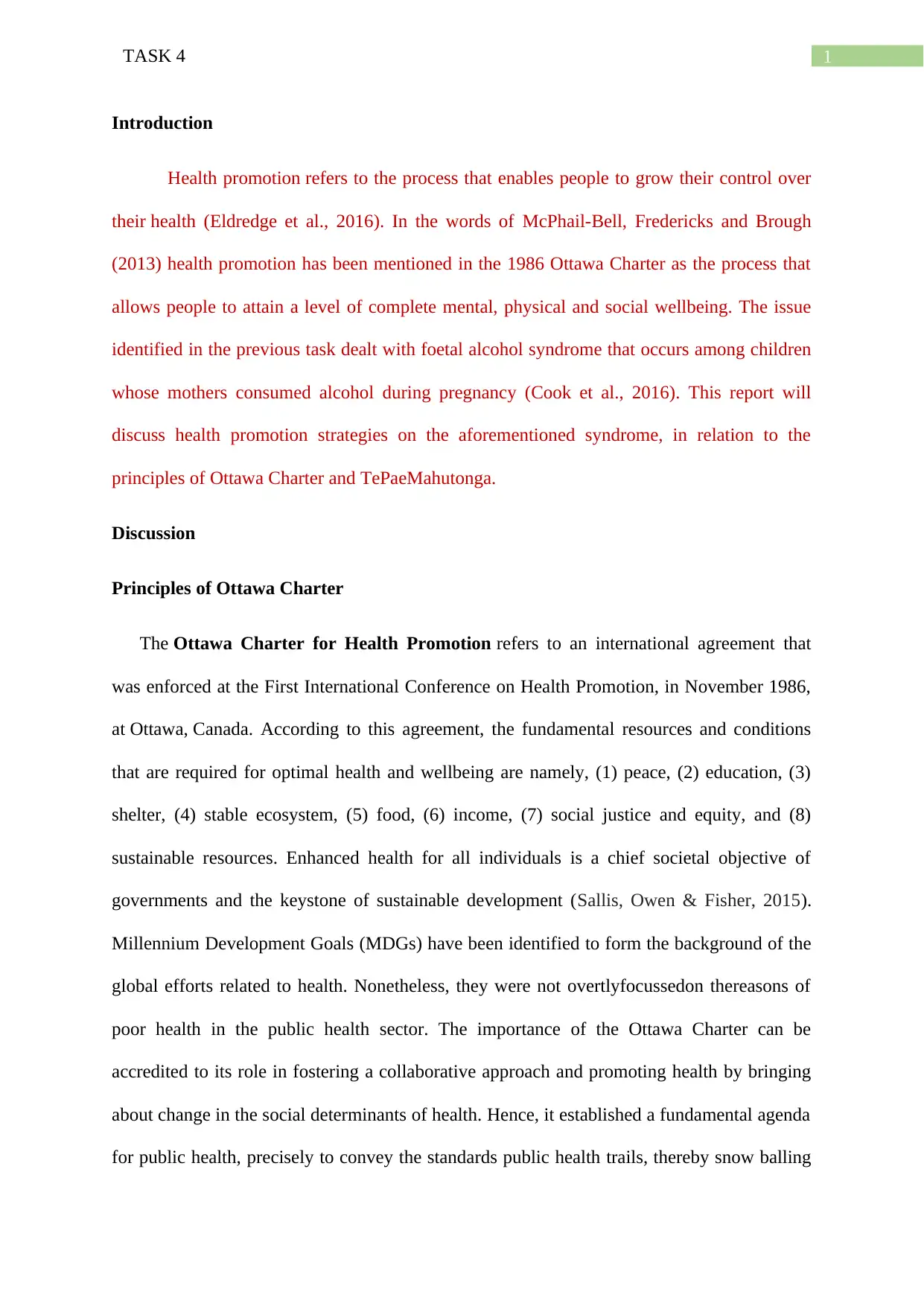
1TASK 4
Introduction
Health promotion refers to the process that enables people to grow their control over
their health (Eldredge et al., 2016). In the words of McPhail-Bell, Fredericks and Brough
(2013) health promotion has been mentioned in the 1986 Ottawa Charter as the process that
allows people to attain a level of complete mental, physical and social wellbeing. The issue
identified in the previous task dealt with foetal alcohol syndrome that occurs among children
whose mothers consumed alcohol during pregnancy (Cook et al., 2016). This report will
discuss health promotion strategies on the aforementioned syndrome, in relation to the
principles of Ottawa Charter and TePaeMahutonga.
Discussion
Principles of Ottawa Charter
The Ottawa Charter for Health Promotion refers to an international agreement that
was enforced at the First International Conference on Health Promotion, in November 1986,
at Ottawa, Canada. According to this agreement, the fundamental resources and conditions
that are required for optimal health and wellbeing are namely, (1) peace, (2) education, (3)
shelter, (4) stable ecosystem, (5) food, (6) income, (7) social justice and equity, and (8)
sustainable resources. Enhanced health for all individuals is a chief societal objective of
governments and the keystone of sustainable development (Sallis, Owen & Fisher, 2015).
Millennium Development Goals (MDGs) have been identified to form the background of the
global efforts related to health. Nonetheless, they were not overtlyfocussedon thereasons of
poor health in the public health sector. The importance of the Ottawa Charter can be
accredited to its role in fostering a collaborative approach and promoting health by bringing
about change in the social determinants of health. Hence, it established a fundamental agenda
for public health, precisely to convey the standards public health trails, thereby snow balling
Introduction
Health promotion refers to the process that enables people to grow their control over
their health (Eldredge et al., 2016). In the words of McPhail-Bell, Fredericks and Brough
(2013) health promotion has been mentioned in the 1986 Ottawa Charter as the process that
allows people to attain a level of complete mental, physical and social wellbeing. The issue
identified in the previous task dealt with foetal alcohol syndrome that occurs among children
whose mothers consumed alcohol during pregnancy (Cook et al., 2016). This report will
discuss health promotion strategies on the aforementioned syndrome, in relation to the
principles of Ottawa Charter and TePaeMahutonga.
Discussion
Principles of Ottawa Charter
The Ottawa Charter for Health Promotion refers to an international agreement that
was enforced at the First International Conference on Health Promotion, in November 1986,
at Ottawa, Canada. According to this agreement, the fundamental resources and conditions
that are required for optimal health and wellbeing are namely, (1) peace, (2) education, (3)
shelter, (4) stable ecosystem, (5) food, (6) income, (7) social justice and equity, and (8)
sustainable resources. Enhanced health for all individuals is a chief societal objective of
governments and the keystone of sustainable development (Sallis, Owen & Fisher, 2015).
Millennium Development Goals (MDGs) have been identified to form the background of the
global efforts related to health. Nonetheless, they were not overtlyfocussedon thereasons of
poor health in the public health sector. The importance of the Ottawa Charter can be
accredited to its role in fostering a collaborative approach and promoting health by bringing
about change in the social determinants of health. Hence, it established a fundamental agenda
for public health, precisely to convey the standards public health trails, thereby snow balling
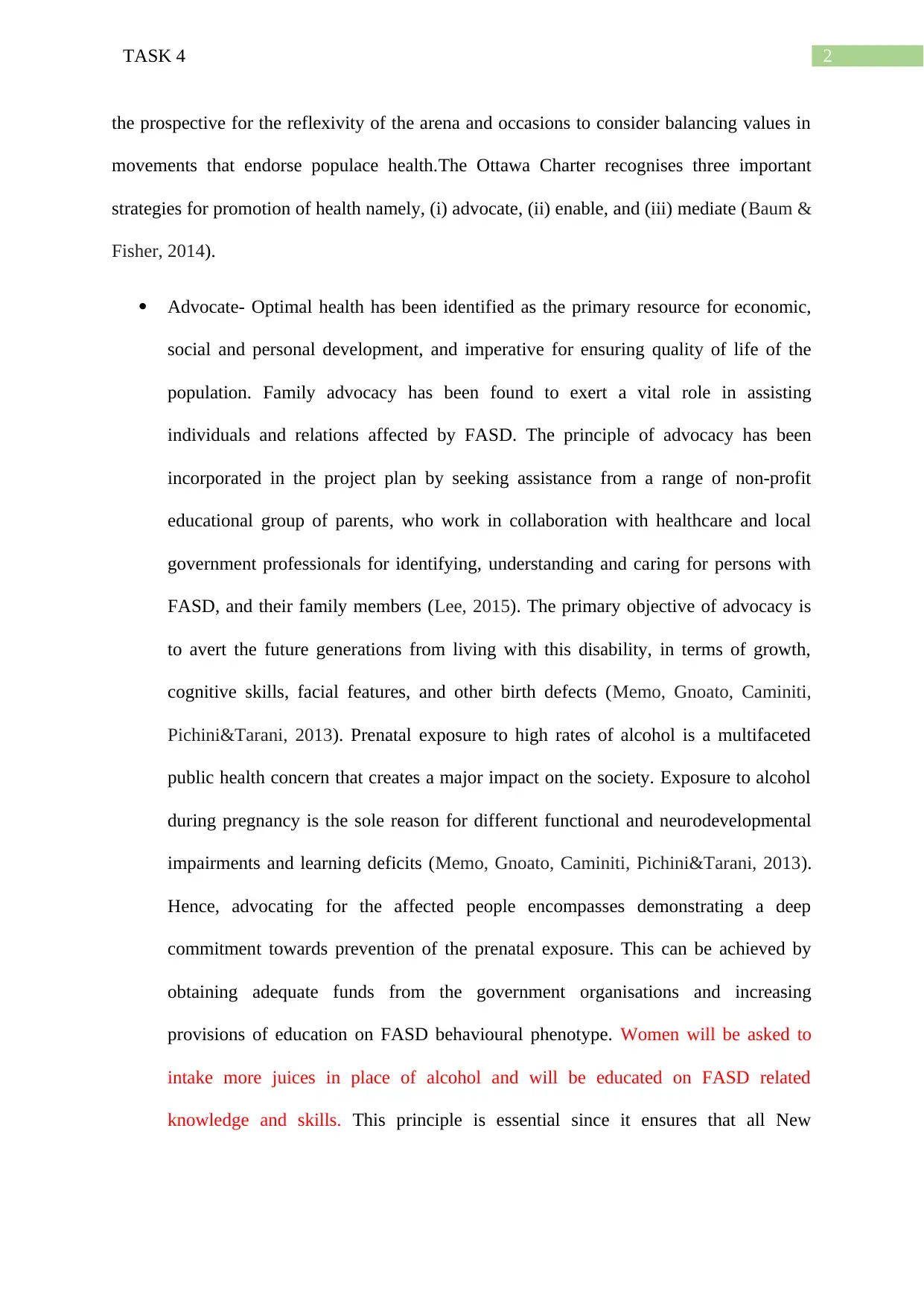
2TASK 4
the prospective for the reflexivity of the arena and occasions to consider balancing values in
movements that endorse populace health.The Ottawa Charter recognises three important
strategies for promotion of health namely, (i) advocate, (ii) enable, and (iii) mediate (Baum &
Fisher, 2014).
Advocate- Optimal health has been identified as the primary resource for economic,
social and personal development, and imperative for ensuring quality of life of the
population. Family advocacy has been found to exert a vital role in assisting
individuals and relations affected by FASD. The principle of advocacy has been
incorporated in the project plan by seeking assistance from a range of non-profit
educational group of parents, who work in collaboration with healthcare and local
government professionals for identifying, understanding and caring for persons with
FASD, and their family members (Lee, 2015). The primary objective of advocacy is
to avert the future generations from living with this disability, in terms of growth,
cognitive skills, facial features, and other birth defects (Memo, Gnoato, Caminiti,
Pichini&Tarani, 2013). Prenatal exposure to high rates of alcohol is a multifaceted
public health concern that creates a major impact on the society. Exposure to alcohol
during pregnancy is the sole reason for different functional and neurodevelopmental
impairments and learning deficits (Memo, Gnoato, Caminiti, Pichini&Tarani, 2013).
Hence, advocating for the affected people encompasses demonstrating a deep
commitment towards prevention of the prenatal exposure. This can be achieved by
obtaining adequate funds from the government organisations and increasing
provisions of education on FASD behavioural phenotype. Women will be asked to
intake more juices in place of alcohol and will be educated on FASD related
knowledge and skills. This principle is essential since it ensures that all New
the prospective for the reflexivity of the arena and occasions to consider balancing values in
movements that endorse populace health.The Ottawa Charter recognises three important
strategies for promotion of health namely, (i) advocate, (ii) enable, and (iii) mediate (Baum &
Fisher, 2014).
Advocate- Optimal health has been identified as the primary resource for economic,
social and personal development, and imperative for ensuring quality of life of the
population. Family advocacy has been found to exert a vital role in assisting
individuals and relations affected by FASD. The principle of advocacy has been
incorporated in the project plan by seeking assistance from a range of non-profit
educational group of parents, who work in collaboration with healthcare and local
government professionals for identifying, understanding and caring for persons with
FASD, and their family members (Lee, 2015). The primary objective of advocacy is
to avert the future generations from living with this disability, in terms of growth,
cognitive skills, facial features, and other birth defects (Memo, Gnoato, Caminiti,
Pichini&Tarani, 2013). Prenatal exposure to high rates of alcohol is a multifaceted
public health concern that creates a major impact on the society. Exposure to alcohol
during pregnancy is the sole reason for different functional and neurodevelopmental
impairments and learning deficits (Memo, Gnoato, Caminiti, Pichini&Tarani, 2013).
Hence, advocating for the affected people encompasses demonstrating a deep
commitment towards prevention of the prenatal exposure. This can be achieved by
obtaining adequate funds from the government organisations and increasing
provisions of education on FASD behavioural phenotype. Women will be asked to
intake more juices in place of alcohol and will be educated on FASD related
knowledge and skills. This principle is essential since it ensures that all New
⊘ This is a preview!⊘
Do you want full access?
Subscribe today to unlock all pages.

Trusted by 1+ million students worldwide
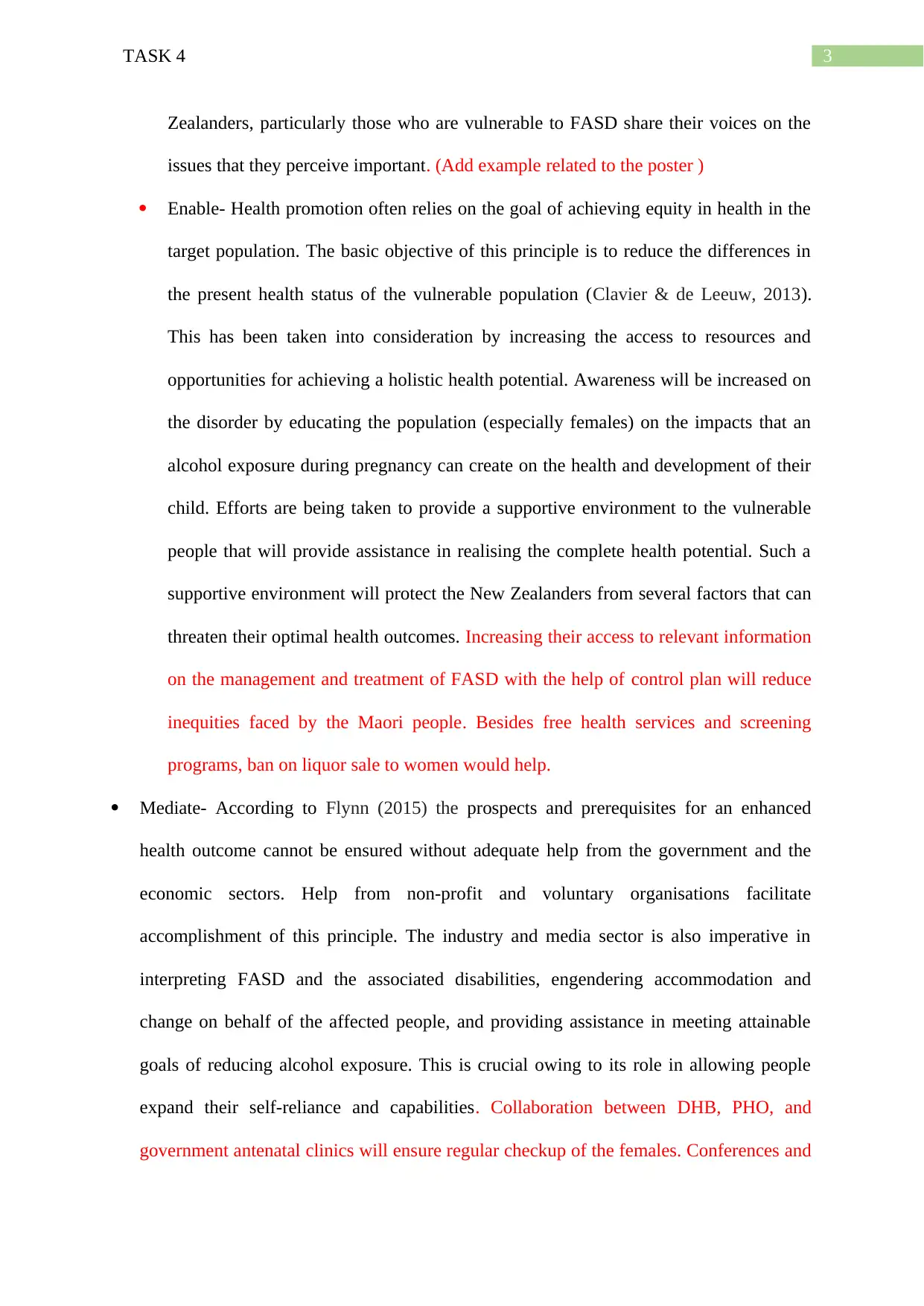
3TASK 4
Zealanders, particularly those who are vulnerable to FASD share their voices on the
issues that they perceive important. (Add example related to the poster )
Enable- Health promotion often relies on the goal of achieving equity in health in the
target population. The basic objective of this principle is to reduce the differences in
the present health status of the vulnerable population (Clavier & de Leeuw, 2013).
This has been taken into consideration by increasing the access to resources and
opportunities for achieving a holistic health potential. Awareness will be increased on
the disorder by educating the population (especially females) on the impacts that an
alcohol exposure during pregnancy can create on the health and development of their
child. Efforts are being taken to provide a supportive environment to the vulnerable
people that will provide assistance in realising the complete health potential. Such a
supportive environment will protect the New Zealanders from several factors that can
threaten their optimal health outcomes. Increasing their access to relevant information
on the management and treatment of FASD with the help of control plan will reduce
inequities faced by the Maori people. Besides free health services and screening
programs, ban on liquor sale to women would help.
Mediate- According to Flynn (2015) the prospects and prerequisites for an enhanced
health outcome cannot be ensured without adequate help from the government and the
economic sectors. Help from non-profit and voluntary organisations facilitate
accomplishment of this principle. The industry and media sector is also imperative in
interpreting FASD and the associated disabilities, engendering accommodation and
change on behalf of the affected people, and providing assistance in meeting attainable
goals of reducing alcohol exposure. This is crucial owing to its role in allowing people
expand their self-reliance and capabilities. Collaboration between DHB, PHO, and
government antenatal clinics will ensure regular checkup of the females. Conferences and
Zealanders, particularly those who are vulnerable to FASD share their voices on the
issues that they perceive important. (Add example related to the poster )
Enable- Health promotion often relies on the goal of achieving equity in health in the
target population. The basic objective of this principle is to reduce the differences in
the present health status of the vulnerable population (Clavier & de Leeuw, 2013).
This has been taken into consideration by increasing the access to resources and
opportunities for achieving a holistic health potential. Awareness will be increased on
the disorder by educating the population (especially females) on the impacts that an
alcohol exposure during pregnancy can create on the health and development of their
child. Efforts are being taken to provide a supportive environment to the vulnerable
people that will provide assistance in realising the complete health potential. Such a
supportive environment will protect the New Zealanders from several factors that can
threaten their optimal health outcomes. Increasing their access to relevant information
on the management and treatment of FASD with the help of control plan will reduce
inequities faced by the Maori people. Besides free health services and screening
programs, ban on liquor sale to women would help.
Mediate- According to Flynn (2015) the prospects and prerequisites for an enhanced
health outcome cannot be ensured without adequate help from the government and the
economic sectors. Help from non-profit and voluntary organisations facilitate
accomplishment of this principle. The industry and media sector is also imperative in
interpreting FASD and the associated disabilities, engendering accommodation and
change on behalf of the affected people, and providing assistance in meeting attainable
goals of reducing alcohol exposure. This is crucial owing to its role in allowing people
expand their self-reliance and capabilities. Collaboration between DHB, PHO, and
government antenatal clinics will ensure regular checkup of the females. Conferences and
Paraphrase This Document
Need a fresh take? Get an instant paraphrase of this document with our AI Paraphraser
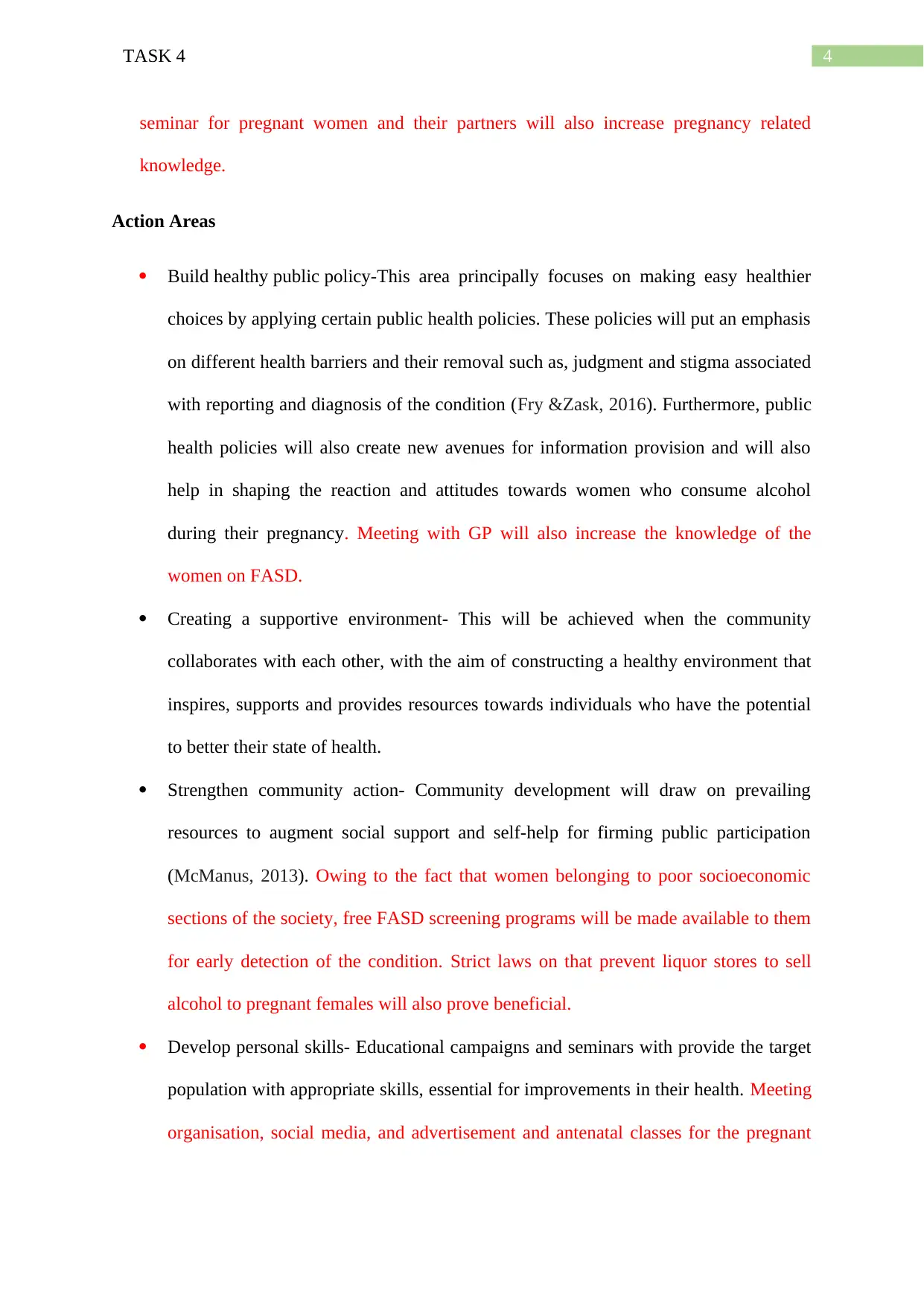
4TASK 4
seminar for pregnant women and their partners will also increase pregnancy related
knowledge.
Action Areas
Build healthy public policy-This area principally focuses on making easy healthier
choices by applying certain public health policies. These policies will put an emphasis
on different health barriers and their removal such as, judgment and stigma associated
with reporting and diagnosis of the condition (Fry &Zask, 2016). Furthermore, public
health policies will also create new avenues for information provision and will also
help in shaping the reaction and attitudes towards women who consume alcohol
during their pregnancy. Meeting with GP will also increase the knowledge of the
women on FASD.
Creating a supportive environment- This will be achieved when the community
collaborates with each other, with the aim of constructing a healthy environment that
inspires, supports and provides resources towards individuals who have the potential
to better their state of health.
Strengthen community action- Community development will draw on prevailing
resources to augment social support and self-help for firming public participation
(McManus, 2013). Owing to the fact that women belonging to poor socioeconomic
sections of the society, free FASD screening programs will be made available to them
for early detection of the condition. Strict laws on that prevent liquor stores to sell
alcohol to pregnant females will also prove beneficial.
Develop personal skills- Educational campaigns and seminars with provide the target
population with appropriate skills, essential for improvements in their health. Meeting
organisation, social media, and advertisement and antenatal classes for the pregnant
seminar for pregnant women and their partners will also increase pregnancy related
knowledge.
Action Areas
Build healthy public policy-This area principally focuses on making easy healthier
choices by applying certain public health policies. These policies will put an emphasis
on different health barriers and their removal such as, judgment and stigma associated
with reporting and diagnosis of the condition (Fry &Zask, 2016). Furthermore, public
health policies will also create new avenues for information provision and will also
help in shaping the reaction and attitudes towards women who consume alcohol
during their pregnancy. Meeting with GP will also increase the knowledge of the
women on FASD.
Creating a supportive environment- This will be achieved when the community
collaborates with each other, with the aim of constructing a healthy environment that
inspires, supports and provides resources towards individuals who have the potential
to better their state of health.
Strengthen community action- Community development will draw on prevailing
resources to augment social support and self-help for firming public participation
(McManus, 2013). Owing to the fact that women belonging to poor socioeconomic
sections of the society, free FASD screening programs will be made available to them
for early detection of the condition. Strict laws on that prevent liquor stores to sell
alcohol to pregnant females will also prove beneficial.
Develop personal skills- Educational campaigns and seminars with provide the target
population with appropriate skills, essential for improvements in their health. Meeting
organisation, social media, and advertisement and antenatal classes for the pregnant
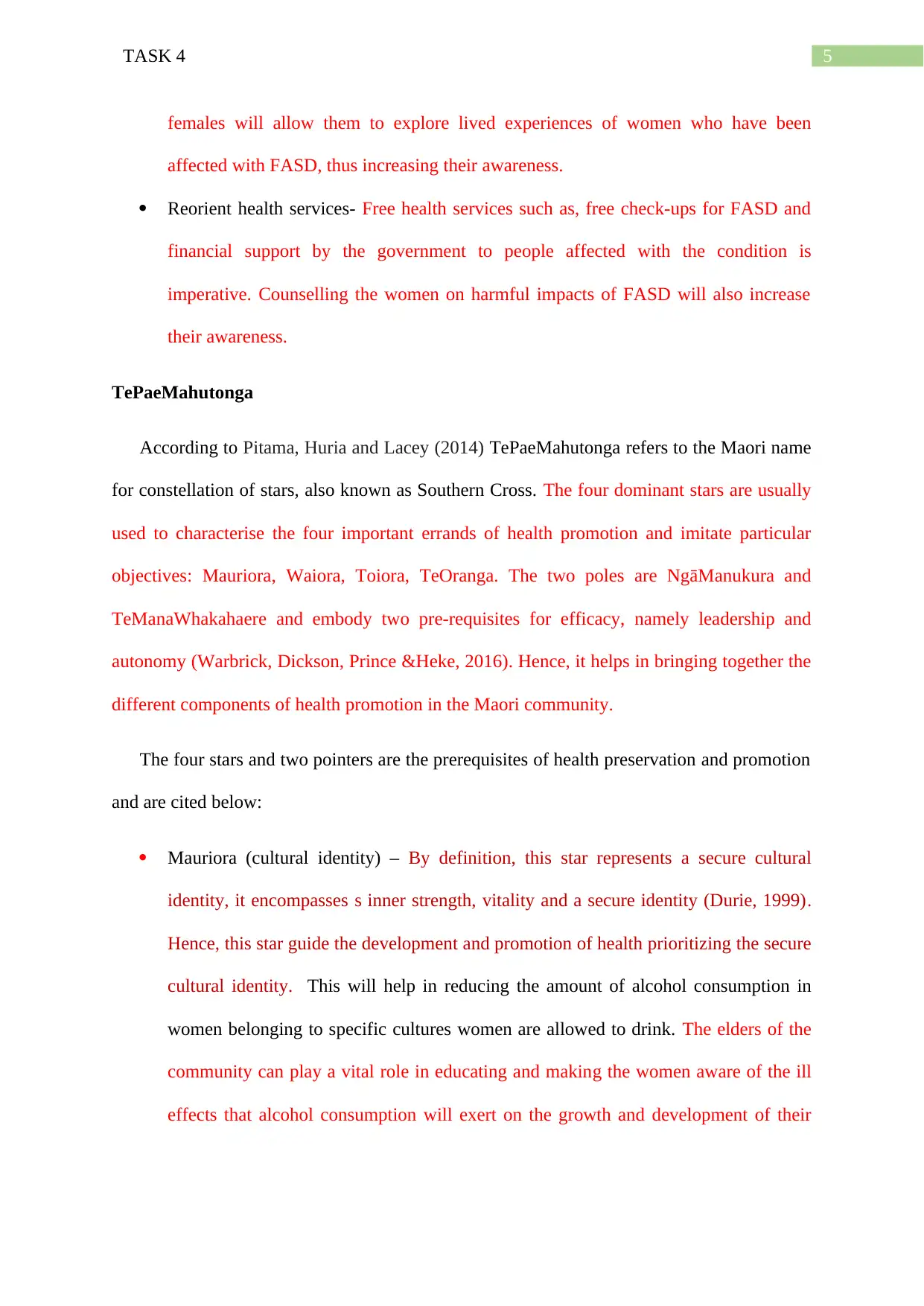
5TASK 4
females will allow them to explore lived experiences of women who have been
affected with FASD, thus increasing their awareness.
Reorient health services- Free health services such as, free check-ups for FASD and
financial support by the government to people affected with the condition is
imperative. Counselling the women on harmful impacts of FASD will also increase
their awareness.
TePaeMahutonga
According to Pitama, Huria and Lacey (2014) TePaeMahutonga refers to the Maori name
for constellation of stars, also known as Southern Cross. The four dominant stars are usually
used to characterise the four important errands of health promotion and imitate particular
objectives: Mauriora, Waiora, Toiora, TeOranga. The two poles are NgāManukura and
TeManaWhakahaere and embody two pre-requisites for efficacy, namely leadership and
autonomy (Warbrick, Dickson, Prince &Heke, 2016). Hence, it helps in bringing together the
different components of health promotion in the Maori community.
The four stars and two pointers are the prerequisites of health preservation and promotion
and are cited below:
Mauriora (cultural identity) – By definition, this star represents a secure cultural
identity, it encompasses s inner strength, vitality and a secure identity (Durie, 1999).
Hence, this star guide the development and promotion of health prioritizing the secure
cultural identity. This will help in reducing the amount of alcohol consumption in
women belonging to specific cultures women are allowed to drink. The elders of the
community can play a vital role in educating and making the women aware of the ill
effects that alcohol consumption will exert on the growth and development of their
females will allow them to explore lived experiences of women who have been
affected with FASD, thus increasing their awareness.
Reorient health services- Free health services such as, free check-ups for FASD and
financial support by the government to people affected with the condition is
imperative. Counselling the women on harmful impacts of FASD will also increase
their awareness.
TePaeMahutonga
According to Pitama, Huria and Lacey (2014) TePaeMahutonga refers to the Maori name
for constellation of stars, also known as Southern Cross. The four dominant stars are usually
used to characterise the four important errands of health promotion and imitate particular
objectives: Mauriora, Waiora, Toiora, TeOranga. The two poles are NgāManukura and
TeManaWhakahaere and embody two pre-requisites for efficacy, namely leadership and
autonomy (Warbrick, Dickson, Prince &Heke, 2016). Hence, it helps in bringing together the
different components of health promotion in the Maori community.
The four stars and two pointers are the prerequisites of health preservation and promotion
and are cited below:
Mauriora (cultural identity) – By definition, this star represents a secure cultural
identity, it encompasses s inner strength, vitality and a secure identity (Durie, 1999).
Hence, this star guide the development and promotion of health prioritizing the secure
cultural identity. This will help in reducing the amount of alcohol consumption in
women belonging to specific cultures women are allowed to drink. The elders of the
community can play a vital role in educating and making the women aware of the ill
effects that alcohol consumption will exert on the growth and development of their
⊘ This is a preview!⊘
Do you want full access?
Subscribe today to unlock all pages.

Trusted by 1+ million students worldwide
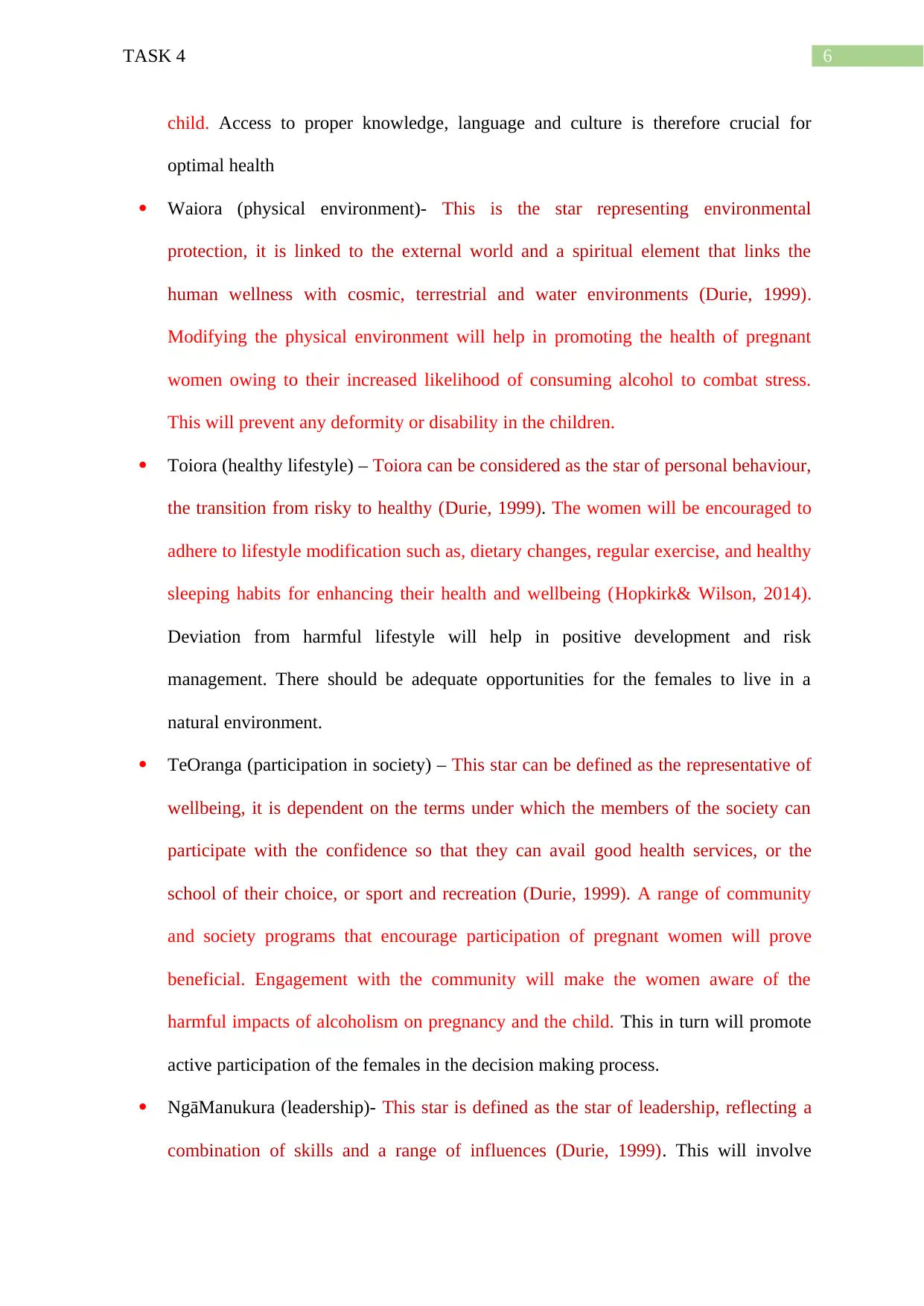
6TASK 4
child. Access to proper knowledge, language and culture is therefore crucial for
optimal health
Waiora (physical environment)- This is the star representing environmental
protection, it is linked to the external world and a spiritual element that links the
human wellness with cosmic, terrestrial and water environments (Durie, 1999).
Modifying the physical environment will help in promoting the health of pregnant
women owing to their increased likelihood of consuming alcohol to combat stress.
This will prevent any deformity or disability in the children.
Toiora (healthy lifestyle) – Toiora can be considered as the star of personal behaviour,
the transition from risky to healthy (Durie, 1999). The women will be encouraged to
adhere to lifestyle modification such as, dietary changes, regular exercise, and healthy
sleeping habits for enhancing their health and wellbeing (Hopkirk& Wilson, 2014).
Deviation from harmful lifestyle will help in positive development and risk
management. There should be adequate opportunities for the females to live in a
natural environment.
TeOranga (participation in society) – This star can be defined as the representative of
wellbeing, it is dependent on the terms under which the members of the society can
participate with the confidence so that they can avail good health services, or the
school of their choice, or sport and recreation (Durie, 1999). A range of community
and society programs that encourage participation of pregnant women will prove
beneficial. Engagement with the community will make the women aware of the
harmful impacts of alcoholism on pregnancy and the child. This in turn will promote
active participation of the females in the decision making process.
NgāManukura (leadership)- This star is defined as the star of leadership, reflecting a
combination of skills and a range of influences (Durie, 1999). This will involve
child. Access to proper knowledge, language and culture is therefore crucial for
optimal health
Waiora (physical environment)- This is the star representing environmental
protection, it is linked to the external world and a spiritual element that links the
human wellness with cosmic, terrestrial and water environments (Durie, 1999).
Modifying the physical environment will help in promoting the health of pregnant
women owing to their increased likelihood of consuming alcohol to combat stress.
This will prevent any deformity or disability in the children.
Toiora (healthy lifestyle) – Toiora can be considered as the star of personal behaviour,
the transition from risky to healthy (Durie, 1999). The women will be encouraged to
adhere to lifestyle modification such as, dietary changes, regular exercise, and healthy
sleeping habits for enhancing their health and wellbeing (Hopkirk& Wilson, 2014).
Deviation from harmful lifestyle will help in positive development and risk
management. There should be adequate opportunities for the females to live in a
natural environment.
TeOranga (participation in society) – This star can be defined as the representative of
wellbeing, it is dependent on the terms under which the members of the society can
participate with the confidence so that they can avail good health services, or the
school of their choice, or sport and recreation (Durie, 1999). A range of community
and society programs that encourage participation of pregnant women will prove
beneficial. Engagement with the community will make the women aware of the
harmful impacts of alcoholism on pregnancy and the child. This in turn will promote
active participation of the females in the decision making process.
NgāManukura (leadership)- This star is defined as the star of leadership, reflecting a
combination of skills and a range of influences (Durie, 1999). This will involve
Paraphrase This Document
Need a fresh take? Get an instant paraphrase of this document with our AI Paraphraser
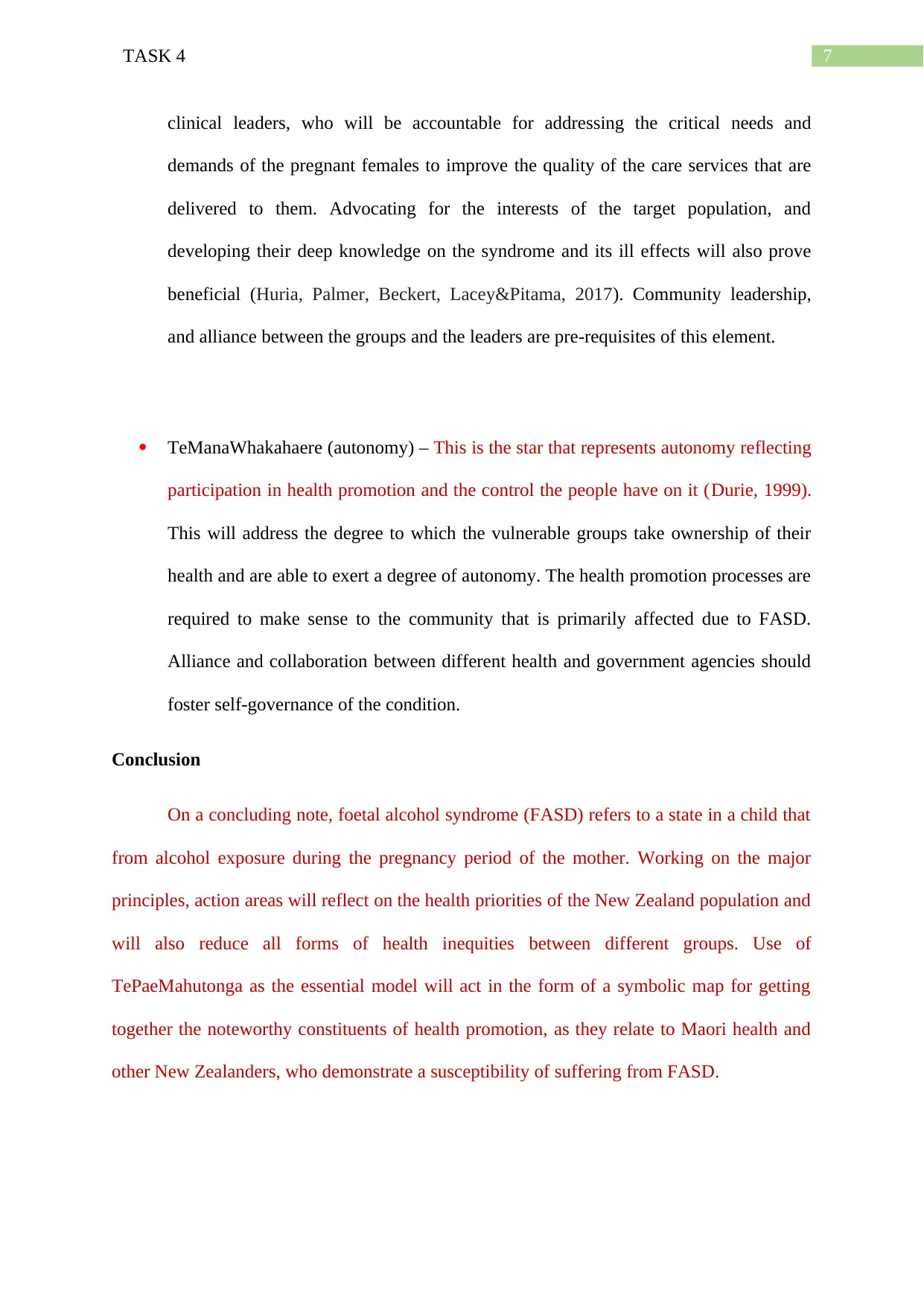
7TASK 4
clinical leaders, who will be accountable for addressing the critical needs and
demands of the pregnant females to improve the quality of the care services that are
delivered to them. Advocating for the interests of the target population, and
developing their deep knowledge on the syndrome and its ill effects will also prove
beneficial (Huria, Palmer, Beckert, Lacey&Pitama, 2017). Community leadership,
and alliance between the groups and the leaders are pre-requisites of this element.
TeManaWhakahaere (autonomy) – This is the star that represents autonomy reflecting
participation in health promotion and the control the people have on it (Durie, 1999).
This will address the degree to which the vulnerable groups take ownership of their
health and are able to exert a degree of autonomy. The health promotion processes are
required to make sense to the community that is primarily affected due to FASD.
Alliance and collaboration between different health and government agencies should
foster self-governance of the condition.
Conclusion
On a concluding note, foetal alcohol syndrome (FASD) refers to a state in a child that
from alcohol exposure during the pregnancy period of the mother. Working on the major
principles, action areas will reflect on the health priorities of the New Zealand population and
will also reduce all forms of health inequities between different groups. Use of
TePaeMahutonga as the essential model will act in the form of a symbolic map for getting
together the noteworthy constituents of health promotion, as they relate to Maori health and
other New Zealanders, who demonstrate a susceptibility of suffering from FASD.
clinical leaders, who will be accountable for addressing the critical needs and
demands of the pregnant females to improve the quality of the care services that are
delivered to them. Advocating for the interests of the target population, and
developing their deep knowledge on the syndrome and its ill effects will also prove
beneficial (Huria, Palmer, Beckert, Lacey&Pitama, 2017). Community leadership,
and alliance between the groups and the leaders are pre-requisites of this element.
TeManaWhakahaere (autonomy) – This is the star that represents autonomy reflecting
participation in health promotion and the control the people have on it (Durie, 1999).
This will address the degree to which the vulnerable groups take ownership of their
health and are able to exert a degree of autonomy. The health promotion processes are
required to make sense to the community that is primarily affected due to FASD.
Alliance and collaboration between different health and government agencies should
foster self-governance of the condition.
Conclusion
On a concluding note, foetal alcohol syndrome (FASD) refers to a state in a child that
from alcohol exposure during the pregnancy period of the mother. Working on the major
principles, action areas will reflect on the health priorities of the New Zealand population and
will also reduce all forms of health inequities between different groups. Use of
TePaeMahutonga as the essential model will act in the form of a symbolic map for getting
together the noteworthy constituents of health promotion, as they relate to Maori health and
other New Zealanders, who demonstrate a susceptibility of suffering from FASD.
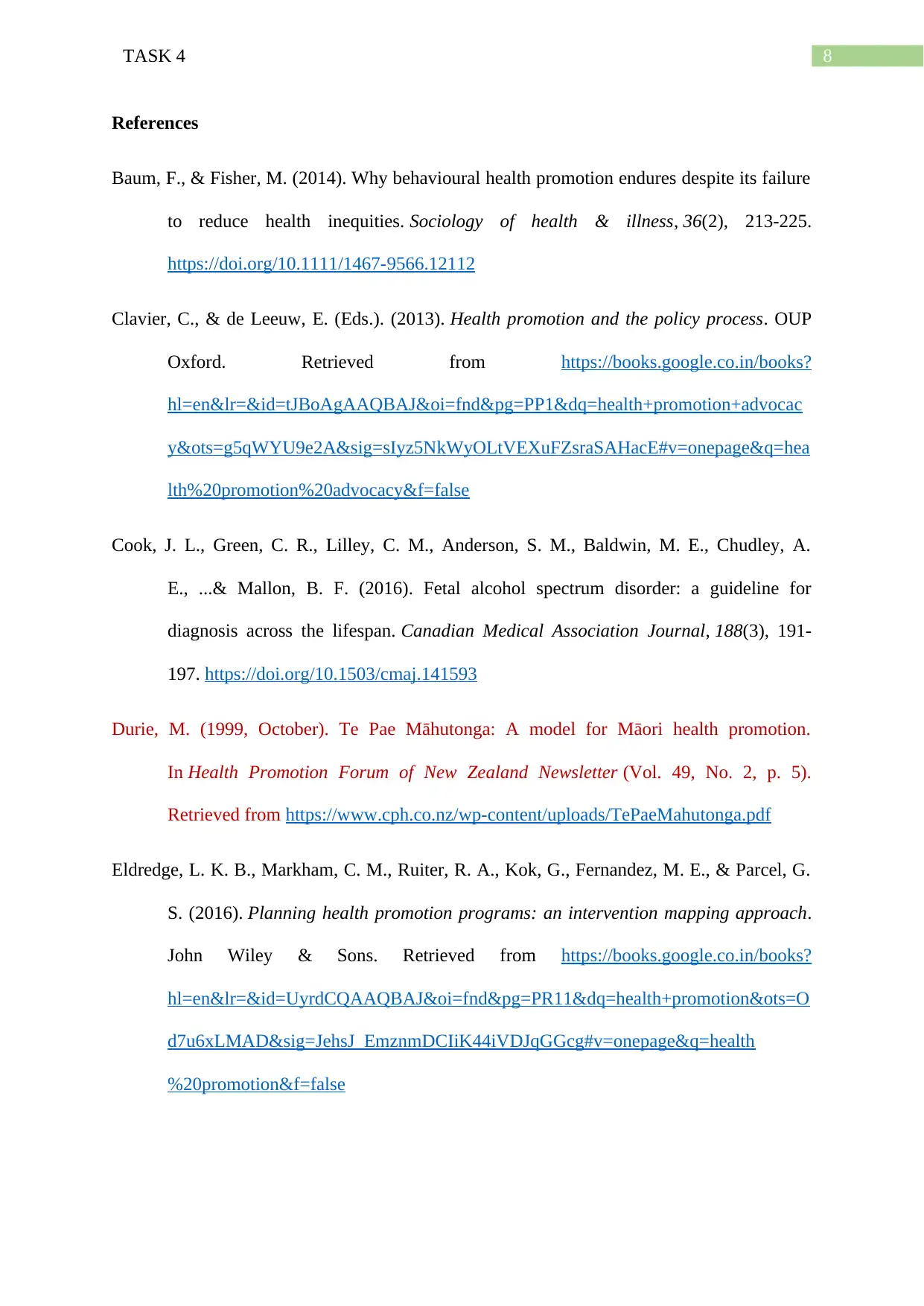
8TASK 4
References
Baum, F., & Fisher, M. (2014). Why behavioural health promotion endures despite its failure
to reduce health inequities. Sociology of health & illness, 36(2), 213-225.
https://doi.org/10.1111/1467-9566.12112
Clavier, C., & de Leeuw, E. (Eds.). (2013). Health promotion and the policy process. OUP
Oxford. Retrieved from https://books.google.co.in/books?
hl=en&lr=&id=tJBoAgAAQBAJ&oi=fnd&pg=PP1&dq=health+promotion+advocac
y&ots=g5qWYU9e2A&sig=sIyz5NkWyOLtVEXuFZsraSAHacE#v=onepage&q=hea
lth%20promotion%20advocacy&f=false
Cook, J. L., Green, C. R., Lilley, C. M., Anderson, S. M., Baldwin, M. E., Chudley, A.
E., ...& Mallon, B. F. (2016). Fetal alcohol spectrum disorder: a guideline for
diagnosis across the lifespan. Canadian Medical Association Journal, 188(3), 191-
197. https://doi.org/10.1503/cmaj.141593
Durie, M. (1999, October). Te Pae Māhutonga: A model for Māori health promotion.
In Health Promotion Forum of New Zealand Newsletter (Vol. 49, No. 2, p. 5).
Retrieved from https://www.cph.co.nz/wp-content/uploads/TePaeMahutonga.pdf
Eldredge, L. K. B., Markham, C. M., Ruiter, R. A., Kok, G., Fernandez, M. E., & Parcel, G.
S. (2016). Planning health promotion programs: an intervention mapping approach.
John Wiley & Sons. Retrieved from https://books.google.co.in/books?
hl=en&lr=&id=UyrdCQAAQBAJ&oi=fnd&pg=PR11&dq=health+promotion&ots=O
d7u6xLMAD&sig=JehsJ_EmznmDCIiK44iVDJqGGcg#v=onepage&q=health
%20promotion&f=false
References
Baum, F., & Fisher, M. (2014). Why behavioural health promotion endures despite its failure
to reduce health inequities. Sociology of health & illness, 36(2), 213-225.
https://doi.org/10.1111/1467-9566.12112
Clavier, C., & de Leeuw, E. (Eds.). (2013). Health promotion and the policy process. OUP
Oxford. Retrieved from https://books.google.co.in/books?
hl=en&lr=&id=tJBoAgAAQBAJ&oi=fnd&pg=PP1&dq=health+promotion+advocac
y&ots=g5qWYU9e2A&sig=sIyz5NkWyOLtVEXuFZsraSAHacE#v=onepage&q=hea
lth%20promotion%20advocacy&f=false
Cook, J. L., Green, C. R., Lilley, C. M., Anderson, S. M., Baldwin, M. E., Chudley, A.
E., ...& Mallon, B. F. (2016). Fetal alcohol spectrum disorder: a guideline for
diagnosis across the lifespan. Canadian Medical Association Journal, 188(3), 191-
197. https://doi.org/10.1503/cmaj.141593
Durie, M. (1999, October). Te Pae Māhutonga: A model for Māori health promotion.
In Health Promotion Forum of New Zealand Newsletter (Vol. 49, No. 2, p. 5).
Retrieved from https://www.cph.co.nz/wp-content/uploads/TePaeMahutonga.pdf
Eldredge, L. K. B., Markham, C. M., Ruiter, R. A., Kok, G., Fernandez, M. E., & Parcel, G.
S. (2016). Planning health promotion programs: an intervention mapping approach.
John Wiley & Sons. Retrieved from https://books.google.co.in/books?
hl=en&lr=&id=UyrdCQAAQBAJ&oi=fnd&pg=PR11&dq=health+promotion&ots=O
d7u6xLMAD&sig=JehsJ_EmznmDCIiK44iVDJqGGcg#v=onepage&q=health
%20promotion&f=false
⊘ This is a preview!⊘
Do you want full access?
Subscribe today to unlock all pages.

Trusted by 1+ million students worldwide
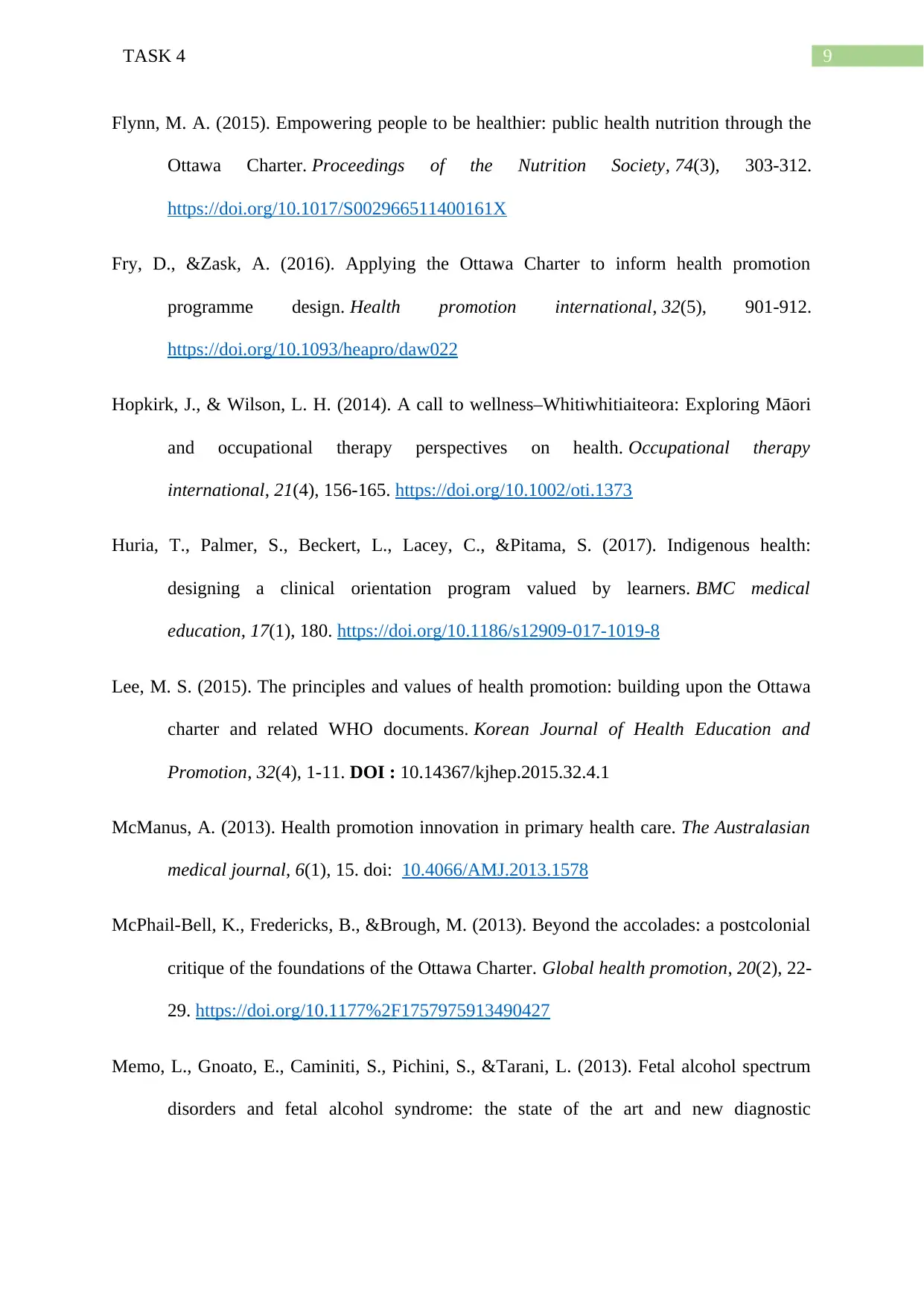
9TASK 4
Flynn, M. A. (2015). Empowering people to be healthier: public health nutrition through the
Ottawa Charter. Proceedings of the Nutrition Society, 74(3), 303-312.
https://doi.org/10.1017/S002966511400161X
Fry, D., &Zask, A. (2016). Applying the Ottawa Charter to inform health promotion
programme design. Health promotion international, 32(5), 901-912.
https://doi.org/10.1093/heapro/daw022
Hopkirk, J., & Wilson, L. H. (2014). A call to wellness–Whitiwhitiaiteora: Exploring Māori
and occupational therapy perspectives on health. Occupational therapy
international, 21(4), 156-165. https://doi.org/10.1002/oti.1373
Huria, T., Palmer, S., Beckert, L., Lacey, C., &Pitama, S. (2017). Indigenous health:
designing a clinical orientation program valued by learners. BMC medical
education, 17(1), 180. https://doi.org/10.1186/s12909-017-1019-8
Lee, M. S. (2015). The principles and values of health promotion: building upon the Ottawa
charter and related WHO documents. Korean Journal of Health Education and
Promotion, 32(4), 1-11. DOI : 10.14367/kjhep.2015.32.4.1
McManus, A. (2013). Health promotion innovation in primary health care. The Australasian
medical journal, 6(1), 15. doi: 10.4066/AMJ.2013.1578
McPhail-Bell, K., Fredericks, B., &Brough, M. (2013). Beyond the accolades: a postcolonial
critique of the foundations of the Ottawa Charter. Global health promotion, 20(2), 22-
29. https://doi.org/10.1177%2F1757975913490427
Memo, L., Gnoato, E., Caminiti, S., Pichini, S., &Tarani, L. (2013). Fetal alcohol spectrum
disorders and fetal alcohol syndrome: the state of the art and new diagnostic
Flynn, M. A. (2015). Empowering people to be healthier: public health nutrition through the
Ottawa Charter. Proceedings of the Nutrition Society, 74(3), 303-312.
https://doi.org/10.1017/S002966511400161X
Fry, D., &Zask, A. (2016). Applying the Ottawa Charter to inform health promotion
programme design. Health promotion international, 32(5), 901-912.
https://doi.org/10.1093/heapro/daw022
Hopkirk, J., & Wilson, L. H. (2014). A call to wellness–Whitiwhitiaiteora: Exploring Māori
and occupational therapy perspectives on health. Occupational therapy
international, 21(4), 156-165. https://doi.org/10.1002/oti.1373
Huria, T., Palmer, S., Beckert, L., Lacey, C., &Pitama, S. (2017). Indigenous health:
designing a clinical orientation program valued by learners. BMC medical
education, 17(1), 180. https://doi.org/10.1186/s12909-017-1019-8
Lee, M. S. (2015). The principles and values of health promotion: building upon the Ottawa
charter and related WHO documents. Korean Journal of Health Education and
Promotion, 32(4), 1-11. DOI : 10.14367/kjhep.2015.32.4.1
McManus, A. (2013). Health promotion innovation in primary health care. The Australasian
medical journal, 6(1), 15. doi: 10.4066/AMJ.2013.1578
McPhail-Bell, K., Fredericks, B., &Brough, M. (2013). Beyond the accolades: a postcolonial
critique of the foundations of the Ottawa Charter. Global health promotion, 20(2), 22-
29. https://doi.org/10.1177%2F1757975913490427
Memo, L., Gnoato, E., Caminiti, S., Pichini, S., &Tarani, L. (2013). Fetal alcohol spectrum
disorders and fetal alcohol syndrome: the state of the art and new diagnostic
Paraphrase This Document
Need a fresh take? Get an instant paraphrase of this document with our AI Paraphraser
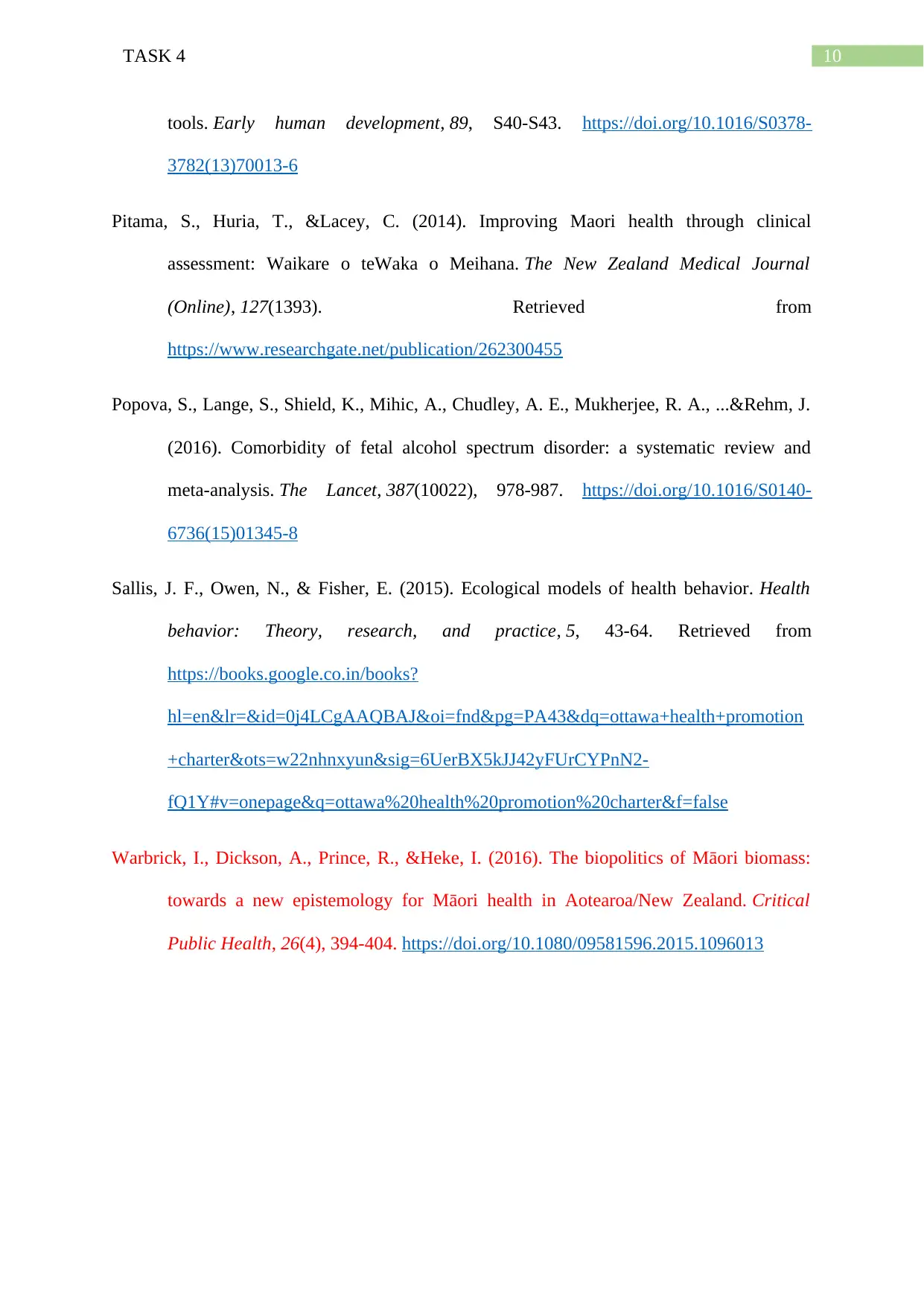
10TASK 4
tools. Early human development, 89, S40-S43. https://doi.org/10.1016/S0378-
3782(13)70013-6
Pitama, S., Huria, T., &Lacey, C. (2014). Improving Maori health through clinical
assessment: Waikare o teWaka o Meihana. The New Zealand Medical Journal
(Online), 127(1393). Retrieved from
https://www.researchgate.net/publication/262300455
Popova, S., Lange, S., Shield, K., Mihic, A., Chudley, A. E., Mukherjee, R. A., ...&Rehm, J.
(2016). Comorbidity of fetal alcohol spectrum disorder: a systematic review and
meta-analysis. The Lancet, 387(10022), 978-987. https://doi.org/10.1016/S0140-
6736(15)01345-8
Sallis, J. F., Owen, N., & Fisher, E. (2015). Ecological models of health behavior. Health
behavior: Theory, research, and practice, 5, 43-64. Retrieved from
https://books.google.co.in/books?
hl=en&lr=&id=0j4LCgAAQBAJ&oi=fnd&pg=PA43&dq=ottawa+health+promotion
+charter&ots=w22nhnxyun&sig=6UerBX5kJJ42yFUrCYPnN2-
fQ1Y#v=onepage&q=ottawa%20health%20promotion%20charter&f=false
Warbrick, I., Dickson, A., Prince, R., &Heke, I. (2016). The biopolitics of Māori biomass:
towards a new epistemology for Māori health in Aotearoa/New Zealand. Critical
Public Health, 26(4), 394-404. https://doi.org/10.1080/09581596.2015.1096013
tools. Early human development, 89, S40-S43. https://doi.org/10.1016/S0378-
3782(13)70013-6
Pitama, S., Huria, T., &Lacey, C. (2014). Improving Maori health through clinical
assessment: Waikare o teWaka o Meihana. The New Zealand Medical Journal
(Online), 127(1393). Retrieved from
https://www.researchgate.net/publication/262300455
Popova, S., Lange, S., Shield, K., Mihic, A., Chudley, A. E., Mukherjee, R. A., ...&Rehm, J.
(2016). Comorbidity of fetal alcohol spectrum disorder: a systematic review and
meta-analysis. The Lancet, 387(10022), 978-987. https://doi.org/10.1016/S0140-
6736(15)01345-8
Sallis, J. F., Owen, N., & Fisher, E. (2015). Ecological models of health behavior. Health
behavior: Theory, research, and practice, 5, 43-64. Retrieved from
https://books.google.co.in/books?
hl=en&lr=&id=0j4LCgAAQBAJ&oi=fnd&pg=PA43&dq=ottawa+health+promotion
+charter&ots=w22nhnxyun&sig=6UerBX5kJJ42yFUrCYPnN2-
fQ1Y#v=onepage&q=ottawa%20health%20promotion%20charter&f=false
Warbrick, I., Dickson, A., Prince, R., &Heke, I. (2016). The biopolitics of Māori biomass:
towards a new epistemology for Māori health in Aotearoa/New Zealand. Critical
Public Health, 26(4), 394-404. https://doi.org/10.1080/09581596.2015.1096013
1 out of 11
Related Documents
Your All-in-One AI-Powered Toolkit for Academic Success.
+13062052269
info@desklib.com
Available 24*7 on WhatsApp / Email
![[object Object]](/_next/static/media/star-bottom.7253800d.svg)
Unlock your academic potential
Copyright © 2020–2026 A2Z Services. All Rights Reserved. Developed and managed by ZUCOL.





